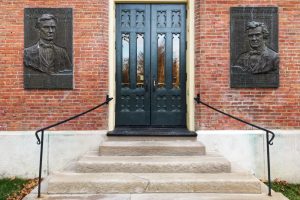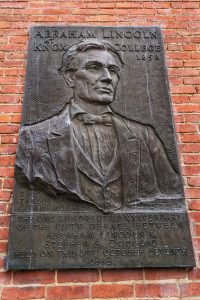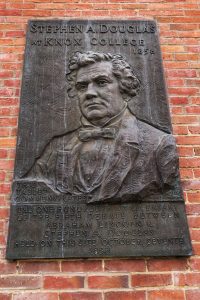BICENTENNIAL 2018: Lincoln turns tide in debates against Douglas in Galesburg
By Owen W. Muelder — October 4, 2018
Tablets of Abraham Lincoln and Stephen Douglas adorn the east entrance of Old Main on the Knox College campus in Galesburg. The tablets were hung during a celebration honoring the 100th anniversary of the Oct. 7, 1858, debate in Galesburg. (Steve Davis/The Register-Mail)
The Lincoln-Douglas Debates are among the most important events in the United State’s history.
The seven debates were conducted throughout Illinois in the summer and fall of 1858. Not only significant in their own time, the debates have since been recognized as an ultimate example of our political process – which has continued throughout the centuries as most office seekers nationwide debate each other every campaign season.
Stephen A. Douglas and Abraham Lincoln were respectively the Democratic and Republican party candidates for the U.S. Senate. The primary question these men discussed was whether slavery should be extended into the nation’s territories.
Lincoln was not an abolitionist, but he loathed slavery and looked forward to a time when it would disappear. He also maintained that it should be forbidden from being established in new states that desired to join the Union. Douglas defended the concept of “Popular Sovereignty,” whereby the people who resided in western territories should have the right to decide if slavery would be allowed.
The slavery question was so important then that no other political issue was raised by either candidate during the debates.
Public oratory was popular in the 19th century; both candidates often used harsh language and outspoken mud-slinging to characterize each other. People attending these contests also shouted out derogatory comments and catcalls toward both men. Spectators came from every part of Illinois to hear the speakers and newspapers throughout the country published detailed accounts.

A tablet of Abraham Lincoln on the Knox College campus commemorates the fifth Lincoln-Douglas debate in Galesburg in 1958.
The first debate, in Ottawa, was held on a blisteringly hot day in the third week of August. Most historians agree Douglas put Lincoln on the defensive; consequently, the “Little Giant” appeared to be the winner.
However, at the second contest in Freeport, Douglas was put on the defensive. Lincoln asked Douglas how he could reconcile his “Popular Sovereignty” stance with the Supreme Court’s Dred Scott decision, which ruled that slaveholders had the right to introduce slavery into the territories. If Douglas responded that he supported the Dred Scott decision he would please Southerners, but if he stood by his “Popular Sovereignty” position, most Southerners would never forgive him.
His reply that day has since been dubbed the “Freeport Doctrine.” Douglas responded to Lincoln’s query by saying the people who settled a territory would determine whether or not slavery could exist there. Put back on his heels, he hoped his answer would satisfy all parties, but it failed.
The third debate, in mid-September in downstate Jonesboro, was poorly attended. In southern Illinois, slavery was popular with many citizens. Lincoln finally came out more forcefully in Jonesboro, but he faced a hostile crowd and was characterized by Douglas as a radical. This debate is considered by most scholars a somewhat inglorious affair. The fourth debate, in Charleston, was on neutral ground for both men and is remembered as a stalemate.

A tablet of Stephen Douglas on the Knox College campus commemorates the fifth Lincoln-Douglas debate in Galesburg in 1958.
On a chilly day at Knox College’s Old Main in Galesburg, the fifth debate on Oct. 7 drew more spectators than any of the other six contests. Lincoln scholars are nearly unanimous in describing this debate as the one where Lincoln found his legs, displaying a confidence he had not shown before.
Lincoln knew Galesburg was an abolitionist town, known for harboring fugitives on the Underground Railroad. Standing erect and self-assured on a stage above the crowd, Lincoln spoke for the first time at length about the immorality of slavery.
“I confess myself as belonging to that class in the country that contemplates slavery as a moral, social and political evil,” he said. Paraphrasing Henry Clay, he accused Douglas of “blowing out the moral lights around us.”
Lincoln biographer Benjamin Thomas described the Galesburg contest as the turning point for Lincoln. One Boston newspaper reporter described Lincoln as “eloquent and bold.” Lincoln was so successful emphasizing this moral theme in Galesburg that he repeated it at the sixth debate in Quincy.
Douglas, often a heavy drinker, was described as “tight”and spoke slowly, hammering home his contention that decisions about slavery should be left to local and state governments. In the final debate, at Alton, which was a rehashing of the previous points, Douglas, his voice fraying, seemed worn down. An energetic Lincoln said the Declaration of Independence applied to all men, not just some, and the slavery question was between right and wrong.
In November, the state Legislature re-elected Douglas by 54 to 46, but the debates catapulted Lincoln’s name and reputation across the nation; the Republican Party nominated him for the presidency two years later. His election victory proved to be a significant watershed in American history.
Owen W. Muelder of Galesburg is director of the Knox College Underground Freedom Railroad Center.
Editor’s note: The weekly Illinois Bicentennial series is brought to you by the Illinois Associated Press Media Editors and Illinois Press Association. More than 20 newspapers are creating stories about the state’s history, places and key moments in advance of the Bicentennial on Dec. 3, 2018. Stories published up to this date can be found at 200illinois.com.
–BICENTENNIAL 2018: Lincoln turns tide in debates against Douglas in Galesburg–







